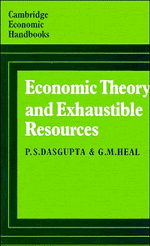Book contents
- Frontmatter
- PREFACE
- Contents
- Chapter 1 A PREVIEW
- Chapter 2 RESOURCE ALLOCATION IN A TIMELESS WORLD
- Chapter 3 EXTERNALITIES
- Chapter 4 INTERTEMPORAL EQUILIBRIUM
- Chapter 5 RENEWABLE RESOURCES: SOME ECOLOGICAL AND ENVIRONMENTAL MODELS
- Chapter 6 EXHAUSTIBLE RESOURCES: AN INTRODUCTION
- Chapter 7 PRODUCTION WITH EXHAUSTIBLE RESOURCES
- Chapter 8 RESOURCE DEPLETION AND CAPITAL ACCUMULATION IN A COMPETITIVE ECONOMY
- Chapter 9 MEASURABILITY, COMPARABILITY AND THE AGGREGATION OF INTERGENERATIONAL WELFARES
- Chapter 10 THE OPTIMAL DEPLETION OF EXHAUSTIBLE RESOURCES
- Chapter 11 IMPERFECT COMPETITION AND EXHAUSTIBLE RESOURCES
- Chapter 12 TAXATION OF EXHAUSTIBLE RESOURCES
- Chapter 13 UNCERTAINTY, INFORMATION AND THE ALLOCATION OF RISK
- Chapter 14 UNCERTAINTY AND THE ALLOCATION OF RESOURCES
- Chapter 15 PRICE MOVEMENTS IN RESOURCE MARKETS
- Chapter 16 CONCLUSIONS
- BIBLIOGRAPHY
- INDEX
Chapter 6 - EXHAUSTIBLE RESOURCES: AN INTRODUCTION
Published online by Cambridge University Press: 04 April 2011
- Frontmatter
- PREFACE
- Contents
- Chapter 1 A PREVIEW
- Chapter 2 RESOURCE ALLOCATION IN A TIMELESS WORLD
- Chapter 3 EXTERNALITIES
- Chapter 4 INTERTEMPORAL EQUILIBRIUM
- Chapter 5 RENEWABLE RESOURCES: SOME ECOLOGICAL AND ENVIRONMENTAL MODELS
- Chapter 6 EXHAUSTIBLE RESOURCES: AN INTRODUCTION
- Chapter 7 PRODUCTION WITH EXHAUSTIBLE RESOURCES
- Chapter 8 RESOURCE DEPLETION AND CAPITAL ACCUMULATION IN A COMPETITIVE ECONOMY
- Chapter 9 MEASURABILITY, COMPARABILITY AND THE AGGREGATION OF INTERGENERATIONAL WELFARES
- Chapter 10 THE OPTIMAL DEPLETION OF EXHAUSTIBLE RESOURCES
- Chapter 11 IMPERFECT COMPETITION AND EXHAUSTIBLE RESOURCES
- Chapter 12 TAXATION OF EXHAUSTIBLE RESOURCES
- Chapter 13 UNCERTAINTY, INFORMATION AND THE ALLOCATION OF RISK
- Chapter 14 UNCERTAINTY AND THE ALLOCATION OF RESOURCES
- Chapter 15 PRICE MOVEMENTS IN RESOURCE MARKETS
- Chapter 16 CONCLUSIONS
- BIBLIOGRAPHY
- INDEX
Summary
Extraction from a Single Competitive Industry: The Pure Royalty Case
(i) Formal characterization of exhaustible resources: It is not difficult to be precise about the definition of an exhaustible resource. If we ignore the act of extraction as a production activity, such a resource is among the class of non-produced goods (i.e. it is a primary commodity). But then, so is agricultural land, and we do not usually regard land as being exhaustible in the same way as fossil fuels are. The distinguishing feature of an exhaustible resource is that it is used up when used as an input in production and at the same time its undisturbed rate of growth is nil. In short, the intertemporal sum of the services provided by a given stock of an exhaustible resource is finite. Land, if carefully tilled, can in principle provide an unbounded sum of services over time. This is the difference. And this remains true even if one contemplates the possibility of recycling an exhaustible resource; for it is not possible, even in principle, to recover the entire quantity used. One will never be able to recover an entire ton of secondary ore from a ton of primary ore in use, or an entire ton of tertiary ore from a ton of secondary ore in use. There will be a leakage at every round of recycling. Moreover this leakage rate is bounded away from zero.
- Type
- Chapter
- Information
- Economic Theory and Exhaustible Resources , pp. 153 - 192Publisher: Cambridge University PressPrint publication year: 1980
- 16
- Cited by



